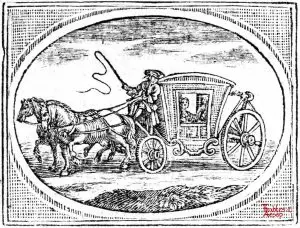A Coachman noticed a creaking wheel on his wagon. He asked the wheel why it complained and it answered that was a privilege of the weak.
Complaining is the privilege of the weak.
[Note: This fable is similar to The Oxen and The Axles but not close enough to be included on the same page.]

JBR Collection
A Coachman hearing one of the wheels of his coach make a great noise, and perceiving that it was the worst one of the four, asked it how it came to take such a liberty. The Wheel answered that from the beginning of time creaking had always been the privilege of the weak.

Samuel Croxall
THE coachman, hearing one of the wheels of his coach creak, was surprised; but more especially when he perceived that it was the worst wheel of the whole set, and which he thought had but little pretense to take such a liberty. But, upon his demanding the reason why it did so, the wheel replied, that it was natural for people who laboured under any affliction or infirmity to complain.
THE APPLICATION
Though we naturally desire to give vent to the fullness of our heart, when it is charged with grief, and though by uttering our complaints, we may happen to move the compassion of those that hear us, yet, every thing considered, it is best to repress and keep them to ourselves; or, if we must let our sorrow speak, to take care that it is done in solitude and retirement. What the poets mention as an usual thing with lovers, would not be amiss in those who are under any froward calamity, which cannot be kept quiet, to utter it to the woods and mountains, and to call the rocks and rivers to witness to the cruelty of their destiny: that is, if they must show any weakness or impatience under the pressure of adverse fortune, to do it as privately as they can: for though the commiseration of a soft-hearted person may be drawn forth sometimes by imparting the bitterness of our condition, yet the world will be apt to think us troublesome and importunate: and conclude, that if our hardships were so great as we would have people believe, we could not bear to think of them so frequently and abundantly, as sometimes we do. But besides, nothing is more generally true, than that it is much happier for us to share the envy, than the pity, of mankind. And if the first of these is by no means eligible, if we could avoid it, how much more ought we to take care to give as little occasion as possible for the latter? Scarce any is one envied without possessing something valuable, or at least desirable; but we no sooner become objects of pity than we are found out to be deficient in some respect or other, and perhaps unfit and unequal for the company and acquaintance with which we formerly conversed. Upon the whole, though we be pitied, we shall never be the more esteemed for being miserable; and if we can but appear happy, ten to one but we shall be beloved in course.
